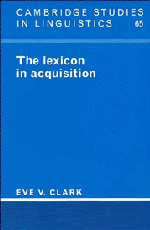Book contents
- Frontmatter
- Contents
- Acknowledgments
- 1 The lexicon: words old and new
- 1 LEXICAL ACQUISITION
- 2 Early lexical development
- 3 The mapping problem
- 4 Conventionality and contrast
- 5 Pragmatic principles and acquisition
- 6 Transparency and simplicity
- 7 Productivity
- 2 CASE STUDIES OF LEXICAL INNOVATION
- 3 CONCLUSION
- Bibliography
- Index of names
- Index of subjects
7 - Productivity
Published online by Cambridge University Press: 05 July 2011
- Frontmatter
- Contents
- Acknowledgments
- 1 The lexicon: words old and new
- 1 LEXICAL ACQUISITION
- 2 Early lexical development
- 3 The mapping problem
- 4 Conventionality and contrast
- 5 Pragmatic principles and acquisition
- 6 Transparency and simplicity
- 7 Productivity
- 2 CASE STUDIES OF LEXICAL INNOVATION
- 3 CONCLUSION
- Bibliography
- Index of names
- Index of subjects
Summary
How do children discover the affixes and compounding patterns they need for coining words? First they need to isolate and identify the relevant building blocks. To do this, they must attend to recurrent elements in the speech around them, and to recurrent combination-types within words. By hearing many familiar roots all with the same added element, they can isolate an affix like -ly or -er and then assign some meaning to it. By hearing combinations of nouns with compound stress, they can identify combination types among compounds. Children must therefore hear enough examples of the relevant word-structures to isolate and store the relevant patterns. Access to such information depends critically on how productive each option is for constructing complex words. That is, the more productive an option is, the more accessible it should be and the earlier it should be acquired by young children.
What makes one form more productive than another? The speakers in a community have preferences in coining new words for particular meanings. They make active use of many word-formation devices. But some (like -ness) they use frequently, some (like -ity) only occasionally, and some (like the -th in depth) not at all. The ones they prefer for coinages and so use more frequently are productive. The first issue is how to identify speaker preferences and hence what is productive in word formation. In established words, usage reflects only what has become conventional.
- Type
- Chapter
- Information
- The Lexicon in Acquisition , pp. 126 - 140Publisher: Cambridge University PressPrint publication year: 1993



